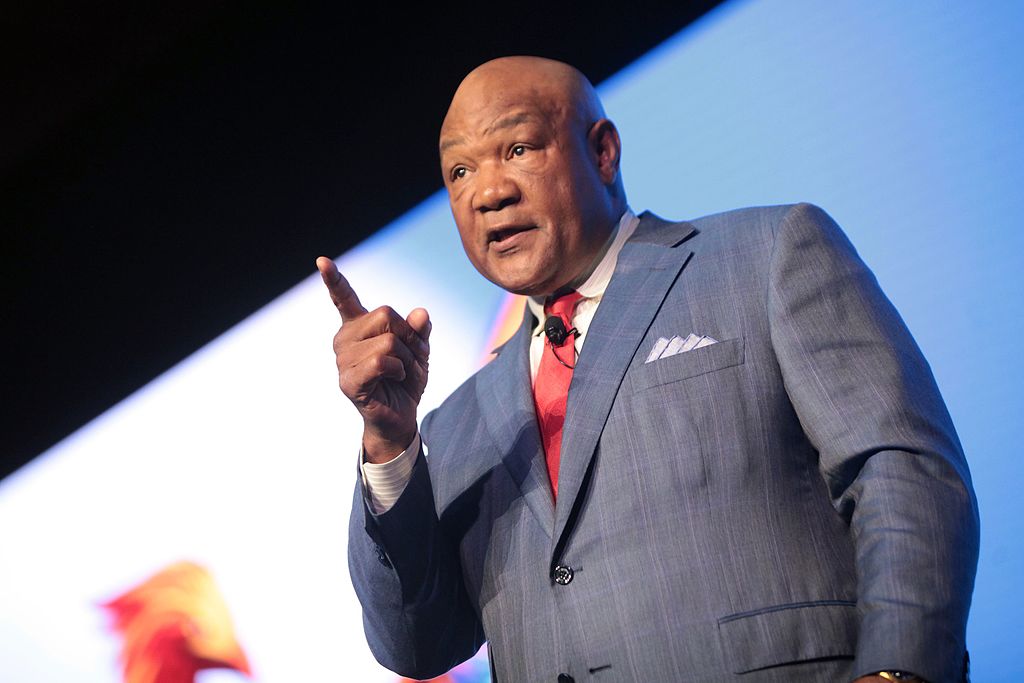“Athletes are artists whose artistry dies with their youth. For fighters, it tends to be worse, as the youth is literally beaten out of them. But George Foreman — erstwhile bully, seller of grill gadgets and mufflers — did the greatest thing any athlete can do. He beat time.” — Mark Kriegel
When former world heavyweight champion Muhammad Ali tried to intimidate reigning champ George Foreman at the start of their famous “Rumble in the Jungle” in 1974, Foreman almost fell down laughing.
“Someone must have told him, ‘Tell him this to psych him out,'” Foreman said years later. “He opened his eyes just a little bit and said, ‘You were just a kid in high school when I fought Sonny Liston. You don’t deserve to be here.'”
Foreman had never spent a day in high school.
When Liston lost the title to Ali in 1964, Foreman was a 15-year-old dropout, living in poverty, headed for a life of crime. While Ali was making a stand against racism, eventually losing his title and his boxing license in 1967 for refusing the draft, “politics didn’t even exist” for Foreman.
“I was so ignorant I thought Lyndon Johnson was President of Texas because every time I saw him he was wearing a cowboy hat,” Foreman said.
That all changed for Foreman when he joined the Job Corps, which not only led him to a career in boxing, but a lifelong love for reading and learning. The first book he read the whole way through was The Autobiography of Malcolm X.
Foreman’s decision to wave a tiny American flag after his Olympic gold medal win in 1968 was seen by some as a response to the Black power salute track and field champions Tommie Smith and John Carlos had given days earlier. But it was about gratitude for the chance in life that Great Society programs had given him, he said. He was just saying what Smith and Carlos were saying in a different way.
“They were trying to say, ‘We are Americans!’” Foreman said. He held a similar view of the controversial decision by Colin Kaepernick and other NFL players to kneel during the national anthem: “If we are the country we say we are, we can handle it.”
The 1970s were regarded as a golden age of boxing, and the greatest era for heavyweights. Foreman was the last of the three who, along with Ali and Joe Frazier, dominated the era. It was a decade that included the most famous fights in history, beginning with 1971’s “Fight of the Century” when undefeated reigning champion Frazier defended the title from the undefeated former champion Ali.
Foreman, too, was undefeated by the time he faced Frazier in the “Sunshine Showdown” in Kingston, Jamaica, in 1973. But Frazier was so heavily favored that announcer Howard Cosell was genuinely shocked by Foreman’s dominance of the two-round fight. Cosell’s repeated cry “Down goes Frazier!” remains iconic to this day.
Even more surprising was the 45-year-old Foreman’s 1994 victory over 26-year-old Michael Moorer. With one knockout punch, Foreman set three boxing records: the oldest ever to win the heavyweight title, with the longest interval between championships, and the largest age gap between fighters.
But for Foreman, nothing ever topped winning the Olympic gold medal.
“That was the most impossible thing that could ever happen to anyone,” he said. “I had never had a dream come true.”‘



